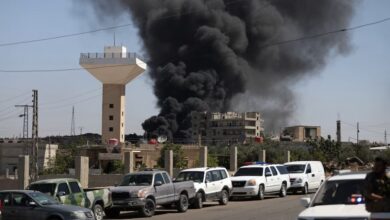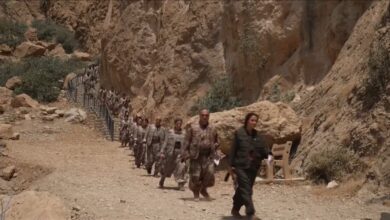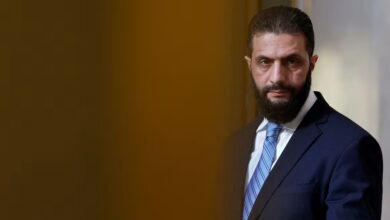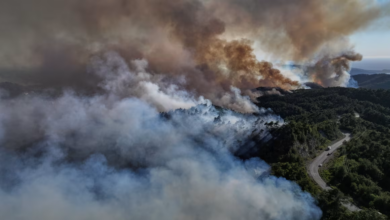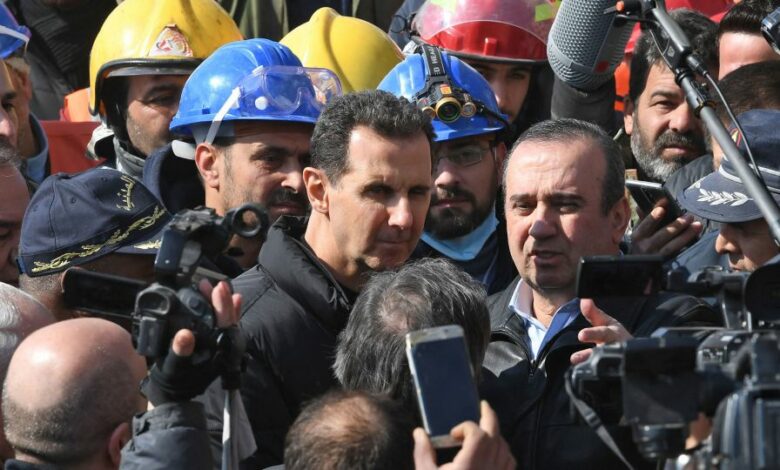
The plane came from Saudi Arabia, one of the staunchest opponents of Syrian President Bashar al-Assad and his Iran-allied regime that has been accused of brutally suppressing an uprising th-t started in 2011.
It was the first Saudi plane to land at a regime airport in more than a decade, and it was aired prominently on both countries’ state-backed media.
Not long ago, such a move would have been inconceivable. In 2016, a bombardment campaign by Assad and his ally Russia battered Aleppo in an effort to take back the city from opposition forces – who at the time were supported by Riyadh.
After years of Syrian infighting, Assad – with Moscow’s help – regained control of most of the country, with the exception of a northern strip still controlled by a number of opposition forces, some of which are backed by Turkey or the United States. The quake impacted areas within the regime’s control as well as those held by the rebels, which relief workers have had difficulty accessing.
The quake has so far killed more than 41,000 in both Syria and Turkey.
Since the quake struck, the Syrian government has mobilized its officials and diplomats to make the argument that Western sanctions against it are hindering the aid effort, but activists and sanctioning states aren’t buying that.
Syrian activists have warned that the Assad government is exploiting the earthquake to rehabilitate itself by calling on international donors to direct aid through Damascus, its capital, and remove the sanctions. Assad, they say, stands to benefit from the earthquake.
“The earthquake gave the regime an advantage to survive politically,” said Omar Alshogre, a Washington, DC-based Syrian activist who says he was detained and tortured by Assad’s regime. “Because the Syrian regime will use the earthquake to normalize itself.”
Assad was sidelined internationally after a 2011 uprising morphed into a bloody civil war between the regime and opposition forces, backed by foreign actors, who wanted to see him go.
Saudi Arabia has been one of the last major hurdles to regional normalization with Assad, whose regime was suspended by the Arab League in November 2011. But rumors have been circulating of late that Syria is close to being re-admitted, pending a no-objection from Saudi Arabia and Qatar, which is yet to reach out to Assad.
During a meeting with European Union foreign policy chief Josep Borrell this week, Saudi Foreign Minister Prince Faisal Bin Farhan emphasized the need to deliver aid “to all parts of Syria,” adding that “we must ensure that the huge humanitarian burden on the Syrian people is lifted.”
Riyadh isn’t the only foreign actor to coordinate with Assad’s regime following the quake. The president has received a number of calls and visits from foreign leaders and diplomats. The United Nations and the EU have also heeded the Syrian demand for cooperation with the regime if they wish to deliver aid to victims in the country.
Among the harshest measures against the Syrian regime is the US’ 2019 Caesar Act, which imposed wide-ranging sanctions to restrict individuals, companies or governments from economic activities that assist Assad’s war effort. The act rendered the entire economy untouchable.
Some Western officials and analysts deny that sanctions are affecting aid deliveries. Still, the US Treasury last week issued a 180-day sanctions waiver on transactions related to earthquake relief.
Charles Lister, senior fellow at the Middle East Institute in Washington, DC, said that “there is no correlation between sanctions by the US and other like-minded partners around the world and the delivery of humanitarian aid.”
“The real obstacles are political,” he told CNN’s Boris Sanchez, adding that the regime has constrained cross-border aid by placing a great deal of pressure on the UN to coordinate with Assad.
Alshogre, the Syrian activist, bemoans the UN’s decision to coordinate with Assad despite the regime’s human rights record, noting that Assad has in the past withheld aid to punish rebels.
But not everyone agrees that coordination will necessarily lead to the regime’s rehabilitation.
Justine Walker, global head of sanctions, compliance and risk at the Association of Certified Anti-Money Laundering Specialists (ACAMS), said difficult discussions will have to be had with the regime if aid is to reach all impacted areas of Syria. “You cannot deliver humanitarian aid in a vacuum without that,” she told CNN.
Walker, who worked on Syrian sanctions for years, stressed the importance of seeing the complexity that comes with sanctions, especially in the context of urgent humanitarian aid.
While sanctions are not the direct cause of slowed humanitarian relief in quake-stricken northwest Syria, they have created a restricted environment that makes it harder to send money, equipment and other forms of relief compared to a non-sanctioned country, she said.
From purchasing jet fuel in the sanctioned country to the overall risk appetite sanctions instill in various international actors, sanctions will ultimately complicate international aid in a situation like that of Syria, she said.
“It really is as complex as it gets around humanitarian response and sanctions,” she told CNN.
The Syrian government didn’t respond to CNN’s request for comment.
Many are skeptical that Assad will deliver aid to his adversaries in regions he once bombed.
The regime has maintained a “siege and starve” strategy over its opponents throughout the country, said Lister.
“So if that aid goes through Damascus, there is an extraordinarily slim chance of any of it ever going into opposition-held areas of the country,” he said, adding that as recently as last year, Assad stifled the flow of humanitarian aid from regime-held to opposition-held areas.
Additional reporting by Mostafa Salem and Celine Alkhaldi

